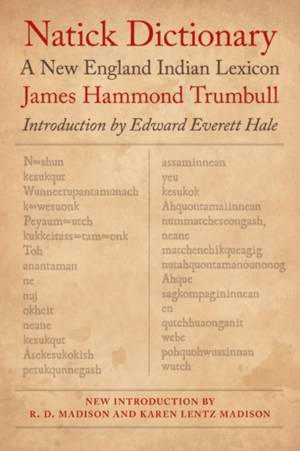
- Retrait gratuit dans votre magasin Club
- 7.000.000 titres dans notre catalogue
- Payer en toute sécurité
- Toujours un magasin près de chez vous
- Retrait gratuit dans votre magasin Club
- 7.000.000 titres dans notre catalogue
- Payer en toute sécurité
- Toujours un magasin près de chez vous
Natick Dictionary
A New England Indian Lexicon (Revised)
James Hammond Trumbull
Livre broché | Anglais
33,95 €
+ 67 points
Format
Description
James Hammond Trumbull was a prolific New England antiquarian and linguist. In connection with his research into the Native languages of New England, his discovery that some of the languages were highly systematic enabled him to decipher the grammar and vocabulary from rough phonetic accounts of the seventeenth and eighteenth centuries. Though Trumbull never saw his work published, the Bureau of American Ethnology finally produced the Natick Dictionary in 1903. Since Trumbull's dictionary translates words both from Natick to English and from English to Natick, it is not only an excellent scholarly resource but also a useful learning tool for nonspecialists approaching Algonkian with only English-language skills. Robert and Karen Madison's introduction to this edition outlines Trumbull's life and writings and also reviews the major sources Trumbull used in his research. James Hammond Trumbull (1821-97) was a philologist and Connecticut historian. He is the author of several books, including The Composition of Indian Geographical Names and The Best Methods of Studying the Indian Languages. Edward Everett Hale (1822-1909) was a Unitarian preacher, as well as an abolitionist and short-story writer. His works, including "The Man without a Country," appeared in Atlantic Monthly. Robert D. Madison is a former professor of English at the United States Naval Academy. Karen Lentz Madison teaches at the University of Arkansas (Fayetteville). Together they have edited James Fenimore Cooper's Ned Myers: Or, A Life Before the Mast and are working on a critical edition of Cooper's The Wept of Wish-Ton-Wish.
Spécifications
Parties prenantes
- Auteur(s) :
- Editeur:
Contenu
- Nombre de pages :
- 392
- Langue:
- Anglais
Caractéristiques
- EAN:
- 9780803222816
- Date de parution :
- 01-06-09
- Format:
- Livre broché
- Format numérique:
- Trade paperback (VS)
- Dimensions :
- 152 mm x 226 mm
- Poids :
- 521 g







